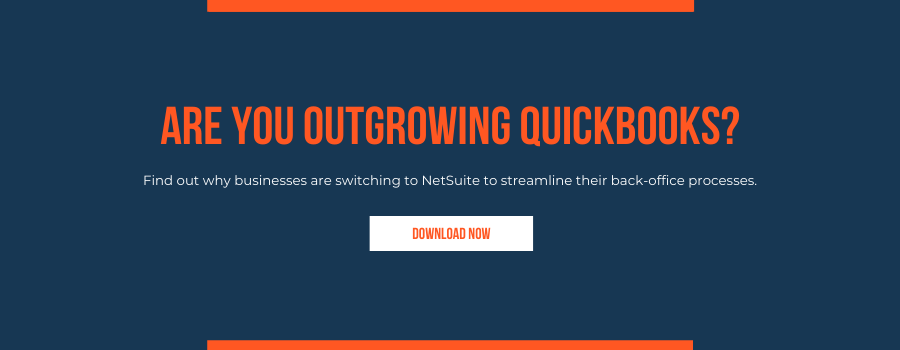Improve the Accuracy of Financial Data with ERP
Chelsea Carter

To say that accuracy is critical in finance would be a gross understatement. In few other industries can a 0.00001 error rate make a huge difference for your company, your clients, regulators, and shareholders. And on top of that, business leaders need accurate financial data now to make the right decisions for their companies.
For these reasons, we've seen extraordinary advancements in financial technology, with perhaps one of the most vital of late being the Enterprise Resource Planning or ERP system.
Despite these advancements, many large companies in the sector use outdated, cumbersome, on-site financial systems that not only hinder productivity, but often increase error rates because employees try to make up for the lost time. These systems are also expensive to manage in-house and limiting in the current financial environment. As a result, some forward-thinking companies are exploring secure and innovative cloud-based solutions like NetSuite ERP.
WHAT IS AN ERP? A QUICK OVERVIEW
An integrated ERP system supports inter-departmental management, oversight, business insights, and decision-making through a centralized approach to operations across an organization. These might include:
- Vendor management
- Customer management
- Logistics
- Inventory
- Human resources
A corporation might also establish a single ERP across affiliated companies, allowing for segmentation and separation of data. This would enable leaders to see branches on both an individual and enterprise level. At the same time, the unification of resources and processes maximizes the utilization of organizational resources.
HOW DOES AN ERP SYSTEM IMPROVE FINANCE DATA ACCURACY?
The finance portion of the ERP collects all of the company's financial data in one place, reducing the need for transferring, sharing, and compiling of data across systems that don't communicate with one another, thereby decreasing opportunities for error.
Furthermore, NetSuite ERP can transform raw financial data into standard financial statements, balance sheets, and ledgers. As a leader, you can track profits and the entire financial situation of the organization in real-time. As a result, preparing for meetings, making quick decisions, and navigating various executive roles is no longer hindered by the delays associated with in-house legacy systems and manual procedures.
NETSUITE ERP FINANCIAL FEATURES
An adaptable ERP system finance module is broken down into components to help management accurately collect and process company data in an integrative way. These may include:
- Financial Analytics
- Forecasting
- Payment Processing Systems
- Asset Management
- Accounts Payable
- General Ledger
- Accounts Receivable
- Cash Management
- Other customizable features as needed
Like the ERP as a whole, each tier of the financial module is interconnected so that financial data from one locale automatically populates in corresponding locations across levels and the larger inter-departmentally integrated ERP, according to established data dependencies.
When all of these tiers and ERP system modules communicate in real-time, everyone throughout the organization is working from the same current data with fewer lags or potential for human error. And rather than encountering a lack of access to information because of a shortcoming in the system, the limiting of information to any team or individual is an intentional act based on your security and compliance needs.
DATA PROCESSING AND MANAGEMENT THROUGH AN ERP SYSTEM FINANCE MODULE
We'll further explore how a NetSuite ERP contributes to accuracy by noting how tiers help you manage operations and make decisions.
Accounts Payable
You can more efficiently manage partnerships with service providers, vendors, and suppliers. You'll know when deliveries are received and services rendered to keep relationships in good standing and reduce inefficiencies in the vendor management processes. Those managing vendor partners always have the most up-to-date and accurate information with which to coordinate the supply of products and services.
General Ledger and Accounts Receivable
31% of small businesses say they often wait at least 30 days to get paid, creating a bottleneck in their ability to pay their own vendors and serve customers. As small companies grow into larger ones, if these issues aren't resolved, they cause magnified damage to partnerships, shareholder trust, and viability. You can streamline collections on accounts receivable and account for customer revenue streams in real-time through adaptable ERPs.
Cash Management
According to a U.S. Bank study, 82% of business failures involve struggles with cash management. Nearly 43% of small businesses say they struggle with cash flow to the point that they don't know if they can make payroll. As a result, the company-employee relationship, as well as recruitment, suffers. Often these aren't revenue problems. They're cash flow problems. Improving how you manage cash can eliminate these issues and strengthen organizations, and it all comes down to the recency and accuracy of your numbers. You can reconcile banking-related records faster and more easily than legacy systems.
Reporting and Analytics
On-demand, easily understandable reports, charts, analysis, and business insights are made available to you in real time.
Forecasting
You can track, analyze, and anticipate trends over time to stay in-the-know and appropriately guide your organization.
Adaptable Features
No two organizations are alike, and even within your organization, different locations may have unique needs. For these reasons, the NetSuite ERP is highly customizable, preventing the dreaded workaround or continued reliance on secondary or even tertiary systems.
THE ERP AND YOUR BUSINESS
The accuracy of financial data all comes down to eliminating redundancy and manual work in financial processes, and this is what the modern cloud-based ERP does so well. It centralizes data and optimizes communication. And it gets rid of manual data transfer processes while providing you with the most accurate, real-time data possible.
Contact us today to learn more about how we can help you implement adaptable, cloud-based ERP solutions.


